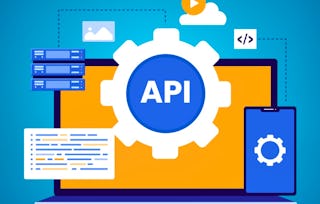Machine Learning with PySpark introduces the power of distributed computing for machine learning, equipping learners with the skills to build scalable machine learning models. Through hands-on projects, you will learn how to use PySpark for data processing, model building, and evaluating machine learning algorithms.

Machine Learning with PySpark

Machine Learning with PySpark
This course is part of PySpark for Data Science Specialization

Instructor: Edureka
Included with
Recommended experience
What you'll learn
Implement machine learning models using PySpark MLlib.
Implement linear and logistic regression models for predictive analysis.
Apply clustering methods to group unlabeled data using algorithms like K-means.
Explore real-world applications of PySpark MLlib through practical examples.
Skills you'll gain
Details to know

Add to your LinkedIn profile
14 assignments
See how employees at top companies are mastering in-demand skills

Build your subject-matter expertise
- Learn new concepts from industry experts
- Gain a foundational understanding of a subject or tool
- Develop job-relevant skills with hands-on projects
- Earn a shareable career certificate

There are 4 modules in this course
This module will instruct you on setting up of an environment for the implementation of machine learning algorithms using PySpark MLlib. You will gain a fundamental understanding of the importance of machine learning in the context of big data and explore the implementation of machine learning models using PySpark.
What's included
27 videos5 readings4 assignments3 discussion prompts
In this module, you will be able to explore the foundations of unsupervised machine learning, focusing on techniques for analyzing unlabeled data. You will dive into clustering algorithms like K-means, learning how to group data points based on similarities. Additionally, you will discover the power of Association Rule Mining, uncovering hidden patterns and relationships in datasets without predefined labels.
What's included
26 videos6 readings5 assignments1 discussion prompt
The course will equip you with the skills to evaluate machine learning models using various performance metrics and techniques in PySpark MLlib. You will also explore the future scope and potential applications of MLlib in real-world scenarios, gaining insights into how it can be applied to different industries and problem domains. Through case studies, you will analyze practical examples of machine learning implementations.
What's included
18 videos2 readings4 assignments2 discussion prompts
This module is meant to test how well you understand the different ideas and lessons you've learned in this course. You will undertake a project based on these PySpark concepts and complete a comprehensive quiz that will assess your confidence and proficiency in Machine Learning with PySpark.
What's included
1 video2 readings1 assignment1 discussion prompt
Earn a career certificate
Add this credential to your LinkedIn profile, resume, or CV. Share it on social media and in your performance review.
Explore more from Machine Learning
 Status: Free Trial
Status: Free Trial Status: Preview
Status: PreviewEdureka
 Status: Free Trial
Status: Free Trial Status: Free Trial
Status: Free Trial
Why people choose Coursera for their career

Felipe M.

Jennifer J.

Larry W.

Chaitanya A.

Open new doors with Coursera Plus
Unlimited access to 10,000+ world-class courses, hands-on projects, and job-ready certificate programs - all included in your subscription
Advance your career with an online degree
Earn a degree from world-class universities - 100% online
Join over 3,400 global companies that choose Coursera for Business
Upskill your employees to excel in the digital economy
Frequently asked questions
This course assumes basic knowledge of Python programming, SQL, and an understanding of machine learning concepts. Familiarity with big data and distributed systems will be helpful but is not mandatory.
PySpark MLlib is Apache Spark’s scalable machine learning library, designed for large-scale data processing. Learning PySpark MLlib helps you implement machine learning algorithms in a distributed computing environment, making it essential for big data applications.
While the course provides a foundation in PySpark and machine learning, it is more suitable for learners who have a basic understanding of machine learning concepts and Python programming.
More questions
Financial aid available,

